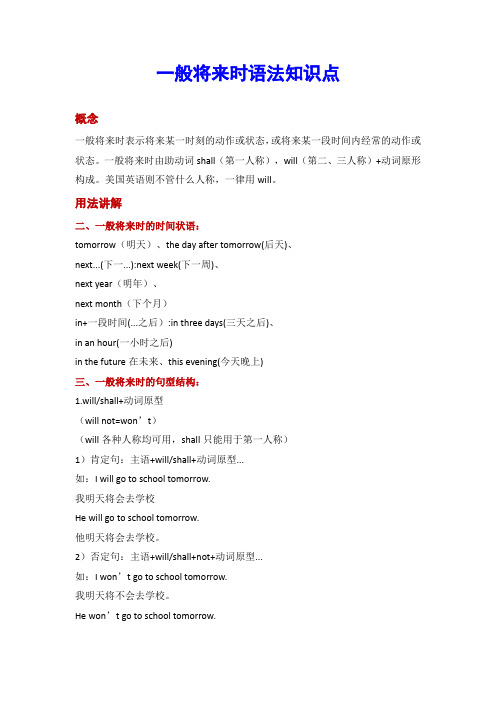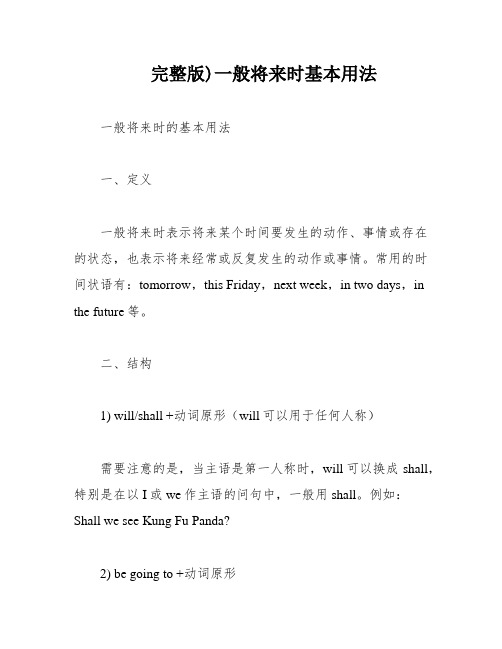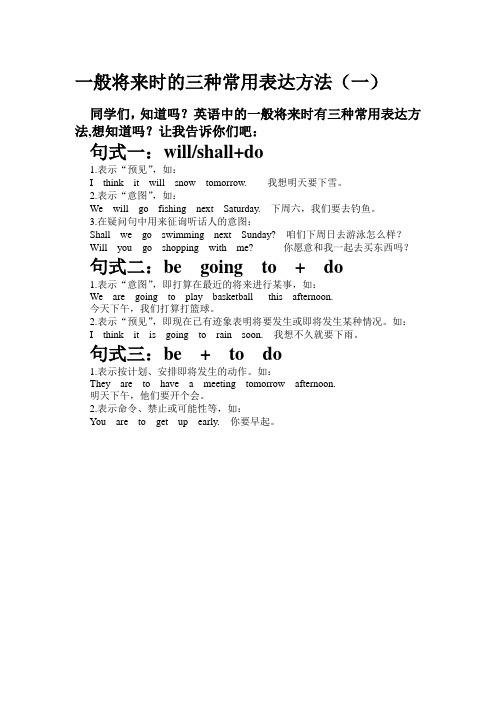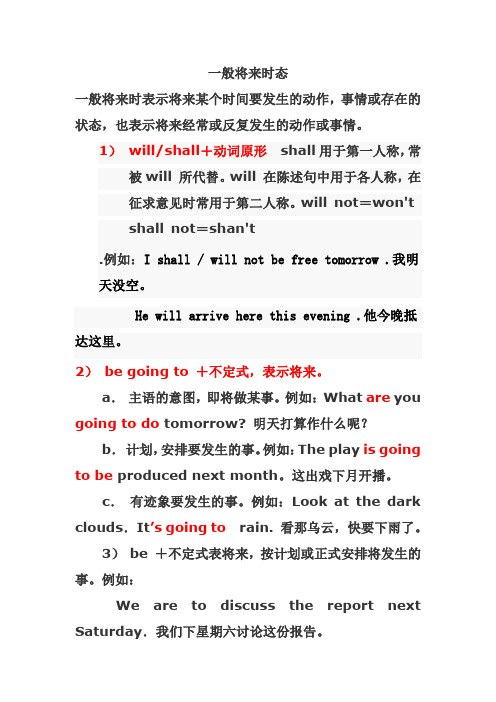六种常用一般将来时表示法一
将来时的六种表达法

将来时的六种表达法1.will/ shall do (will可用于第一、二、三人称,shall只用于第一人称)(1) 这种将来意义常常夹杂着情态意义,即带有说话人的主观态度和看法。
You will fail the test if you don’t work hard.(2) 有时既表示将来,也含有“意愿〞或“意图〞。
e.g. I will meet you at 6 o’clock.(3) 在疑问句中will/ shall还可用来征询听话人的“意图〞。
e.g. Will you be at home at seven this eveninge.g. --- Will you marry me --- Yes, I will.特别提示:1).will 可表示根据当时的情况,临时所做的打算。
e.g.-----Mr. Wang is ill in hospital. ----Oh, I’ll go and see him.e.g.-----Did you tell Julia about the result----- Oh,no,I forget.I_____ her nowA.will be callingB. will callC. callD. am to call2.)表单纯将来的will通常不用于时间,条件,让步状语从句,而是用一般现在时代替。
If 引导的条件状语从句中使用will不表将来,而表意愿。
e.g.I’ll tell him the truth if I see him tomorrow.e.g.1.If you will listen to me, I’ll tell you the truth. 2. If you __ for another ten minutes,Mr Brown will be here.A.will waitB.are going to waitC.are about to waitD.are waiting3) won’t 可表示拒绝做某事,用于物时,好似无生命的物体有了意志力。
一般将来时语法知识点

一般将来时语法知识点概念一般将来时表示将来某一时刻的动作或状态,或将来某一段时间内经常的动作或状态。
一般将来时由助动词shall(第一人称),will(第二、三人称)+动词原形构成。
美国英语则不管什么人称,一律用will。
用法讲解二、一般将来时的时间状语:tomorrow(明天)、the day after tomorrow(后天)、next...(下一...):next week(下一周)、next year(明年)、next month(下个月)in+一段时间(...之后):in three days(三天之后)、in an hour(一小时之后)in the future在未来、this evening(今天晚上)三、一般将来时的句型结构:1.will/shall+动词原型(will not=won’t)(will各种人称均可用,shall只能用于第一人称)1)肯定句:主语+will/shall+动词原型...如:I will go to school tomorrow.我明天将会去学校He will go to school tomorrow.他明天将会去学校。
2)否定句:主语+will/shall+not+动词原型...如:I won’t go to school tomorrow.我明天将不会去学校。
He won’t go to school tomorrow.他明天将不会去学校。
3)一般疑问句:Will/Shall+主语+动词原型...如:Will you go to school tomorrow?你明天要去学校吗?Will he go to school tomorrow?他明天要去学校吗?肯定回答:Yes,主语+will.如:Yes,I will.Yes,he will.否定回答:No,主语+will+not.如:No,I won’t.No,he won’t.4)特殊疑问句:特殊疑问词+will/shall+主语+动词原型... 如:What will you do tomorrow?你明天将会做什么?What will he do tomorrow?他明天将会做什么?2.be going to+动词原型1)肯定句:主语+be going to+动词原型...如:I am going to buy some books tomorrow.我明天打算去买一些书。
完整版)一般将来时基本用法

完整版)一般将来时基本用法一般将来时的基本用法一、定义一般将来时表示将来某个时间要发生的动作、事情或存在的状态,也表示将来经常或反复发生的动作或事情。
常用的时间状语有:tomorrow,this Friday,next week,in two days,in the future等。
二、结构1) will/shall +动词原形(will可以用于任何人称)需要注意的是,当主语是第一人称时,will可以换成shall,特别是在以I或we作主语的问句中,一般用shall。
例如:Shall we see Kung Fu Panda?2) be going to +动词原形例如:I’m going to play the piano。
be going to和will的区别be going to和will的用法虽然都表示将来发生动作或情况,一般情况下能互换。
但它们的用法是有区别的。
be going to主要用于:1、表示事先经过考虑、安排好打算、计划要做的事情。
例如:Dad and I are going to watch an opera this afternoon.2、表示根据目前某种迹象判断,某事非常有可能发生。
例如:Look。
There come the dark clouds。
It is going to rain.三、一般疑问句和否定句一般疑问句:1) will/shall +动词原形(will可以用于任何人称)——在will后加not2) be going to +动词原形——在be后加not例如:She will come back in three days.Will she not come back in three days?They are going to clean their classroom.Are they not going to clean their classroom?否定句:1) will/shall +动词原形(will可以用于任何人称)——将will提前2) be going to +动词原形——将be提前例如:She will come back in three days.She will not come back in three days.Will she come back in three days?XXX is whether they will actually do it。
将来时的六种表示法

一般将来时的六种表示法一、will/shallwill/shall通常用来表示将来时间。
Will用于第一、二、三人称主语,shall用于第一人称主语,都可以表示将来时,但是这种意义通常夹杂着情态意义,即带有说话人的主观态度和看法,比如表示“预见”:You will feel better if you after taking this medicine.He won’t be here in time unless he comes by air.We shall know the result next week.I am sure that I shall not lose my way in the woods.有时候表示将来,也含有“意愿”或“意图”I will do it if you like it.As the railway is not yet open to traffic, we shall go by boat.I promised to pay him back in time, but he won’t lend it to me.二、be going to这一结构的主要意义,一是表示“意图”,即打算在将来做什么。
Are you going to post that letter by air mail?How long is he going to stay here? 由于没有语境的限制,也可以换成will。
We’re going to call a meeting to discuss it.意图的体现者通常是句子的主语,但也有可能不是。
如:He’s not going to cheat me again.(=I won’t let him cheat me again.)二是表示“预见”,即现在已有的迹象表明将要或即将发生某种情况。
如:I feel dizzy. I think I am going to faint.Good heavens! I must hurry. I’m going to be late.Look at that black clouds——there is going to be a storm.表“意图”的用法有时候可以与“will+do”互换使用,但是也要注意区分。
一般将来时的三种常用表达方法(一)

一般将来时的三种常用表达方法(一)
同学们,知道吗?英语中的一般将来时有三种常用表达方法,想知道吗?让我告诉你们吧:
句式一:will/shall+do
1.表示“预见”,如:
I think it will snow tomorrow. 我想明天要下雪。
2.表示“意图”,如:
We will go fishing next Saturday. 下周六,我们要去钓鱼。
3.在疑问句中用来征询听话人的意图:
Shall we go swimming next Sunday? 咱们下周日去游泳怎么样?
Will you go shopping with me? 你愿意和我一起去买东西吗?句式二:be going to + do
1.表示“意图”,即打算在最近的将来进行某事,如:
We are going to play basketball this afternoon.
今天下午,我们打算打篮球。
2.表示“预见”,即现在已有迹象表明将要发生或即将发生某种情况。
如:
I think it is going to rain soon. 我想不久就要下雨。
句式三:be + to do
1.表示按计划、安排即将发生的动作。
如:
They are to have a meeting tomorrow afternoon.
明天下午,他们要开个会。
2.表示命令、禁止或可能性等,如:
You are to get up early. 你要早起。
一般将来时态

一般将来时态一般将来时表示将来某个时间要发生的动作,事情或存在的状态,也表示将来经常或反复发生的动作或事情。
1)will/shall+动词原形shall用于第一人称,常被will 所代替。
will 在陈述句中用于各人称,在征求意见时常用于第二人称。
will not=won'tshall not=shan't.例如:I shall / will not be free tomorrow .我明天没空。
He will arrive here this evening .他今晚抵达这里。
2)be going to +不定式,表示将来。
a.主语的意图,即将做某事。
例如:What are you going to do tomorrow? 明天打算作什么呢?b.计划,安排要发生的事。
例如:The play is going to be produced next month。
这出戏下月开播。
c.有迹象要发生的事。
例如:Look at the dark clouds.It’s going to rain. 看那乌云,快要下雨了。
3)be +不定式表将来,按计划或正式安排将发生的事。
例如:We are to discuss the report next Saturday.我们下星期六讨论这份报告。
4)be about to +不定式,意为马上做某事。
例如:He is about to leave for Beijing.他马上要去北京。
注意:be about to do 不能与tomorrow,next week 等表示明确将来时的时间状语连用。
Notice:be to和be going tobe to 表示客观安排或受人指示而做某事,be going to 表示主观的打算或计划。
例如:I am to play football tomorrow afternoon.明天下午我去踢球。
(客观安排)I'm going to play football tomorrow afternoon.明天下午我想去踢球。
英语动词的将来时
英语动词的将来时摘要英语动词的将来时是用来表示将来某一时刻或某一段时间内发生的动作或状态,或者表示对将来的打算、预测、安排等。
英语动词的将来时有多种表达方式,主要有以下六种:will/shall + 动词原形be going to + 动词原形be + to + 动词原形be about to + 动词原形be + 现在分词一般现在时这六种表达方式有不同的含义和用法,需要根据语境和语气来选择合适的一种。
本文将分别介绍这六种表达方式的定义、结构、用法和例句,并用表格来对比它们的异同。
1. will/shall + 动词原形1.1 定义will/shall + 动词原形是一种最常用的表示将来时的方式,它可以表示即将发生的动作或状态,或者表示对将来的打算、意愿、决定、预测等。
1.2 结构will/shall + 动词原形的结构如下:人称肯定句否定句一般疑问句特殊疑问句第一人称单数I shall/will do I shall not/will not do Shall/Will I do?What shall/will I do?第二人称单数You will do You will not do Will you do?What will you do?第三人称单数He/She/It will do He/She/It will not do Will he/she/it do?What will he/she/it do?第一人称复数We shall/will do We shall not/will not do Shall/Will we do?What shall/will we do?第二人称复数You will do You will not do Will you do?What will you do?第三人称复数They will do They will not do Will they do?What will they do?1.3 用法will/shall + 动词原形的用法如下:表示即将发生的动作或状态,常与表示将来时间的状语连用,如 tomorrow, next week, in the future 等。
一般将来时的五种表达方法
一般将来时的五种表达方法定义:一般将来时表示将来某个时间要发生的动作或存在的状态,也表示将来经常或反复发生的动作。
常常与表示将来的时间状语连用。
常用的表达形式共有五种,现归纳如下:一、用will或shall表示。
“助动词will或shall+动词原形”这一形式,表示将来发生的事情,用于征求对方的意见或表示客气的邀请。
在口语中will用于所有人称,书面语中第一人称常用shall。
如:1. Tomorrow will be Sunday. 明天就是星期天。
2. The rain will stop soon. 雨很快就要停了。
3. Shall we go there at five? 我们五点钟去那儿,好吗?4. Will you please open the door? 请你把门打开,好吗?二、用be going to结构表示。
“be going to+动词原形”用来表示近期或事先考虑过的将要发生的动作以及已有迹象表明必将发生某事,意为“打算;就要”。
如:1. We're going to meet outside the school gate. 我们打算在校门口见面。
2. Look! It's going to rain. 瞧!快下雨了。
三、用现在进行时表示。
表示位置转移的动词(如:go, come, leave, start, arrive 等),可用现在进行时表示将来时。
如:1. Uncle Wang is coming. 王叔叔就要来了。
2. They're leaving for Beijing. 他们即将前往北京。
四、用一般现在时表示。
根据规定或时间表预计要发生的动作,在时间和条件状语从句中,都可用一般现在时表示将来时。
如:1. The new term starts (begins) on August 29th. 新学期八月二十九日开学。
2. If it doesn’t rain tomorrow, we will go out for a picnic.如果明天不下雨,我们将出去野餐。
英语将来时的几种表达法分别是什么
英语将来时的几种表达法分别是什么一般将来时表示将来某个时间要发生的动作或存在的状态,也表示将来经常或反复发生的动作,常与表示将来的时间状语连用。
一般将来时的表示方法有多种形式。
例如:will / shall +动词原形;be going to+动词原形;be+v. ing;be to(be about to)+动词原形结构等。
英语将来时的几种表达法1英语将来时的表达法be going to +动词原形表示主语现在的意图或打算在最近将要做的事情。
shall/will + 动词原形shall 只能用于第一人称I/We, will可以用于任何人称,如果是You and I 作为主语时,也用will.值得注意的是:be going to 和will 略有不同,be going to 表示事先经过考虑的打算,而will多表示意愿、决心。
以下这个句子不能用will进行替换(详细的两者区别,下次再详述,这里不再赘述)be + to do(动词原形)主要表示按计划或安排将要做的事情。
be about to do(动词原形)表示就要做或者正好要做某事,后面也可与when 连用,暗示时间上的巧合。
be +doing (现在分词)某些表示趋向性的瞬间动词,如come,go ,leave,arrive,begin,start,stop,close,open,die,join,borrow,buy可以用进行时的形式来表示将来的概念,现在进行时表一般将来,过去进行时表过去将来。
2一般将来时标志性词汇tomorrow 明天the day after tomorrow 后天next week/year 下周、明年in the future 在将来the day after tomorrow 后天this evening/afternoon/ year今天晚上、今天下午、今年before long 不久以后next year/month/week/summer 明年、下个月、下星期、明年夏天in the future,some day 未来、将来的某一天in two weeks/days/years 两(周、天、年)后。
几种将来时间表示法的比较
几种将来时间表示法的比较表示在将来某个点时间或段时间要发生的动作用一般将来时。
现代英语中表示将来信息的结构有六种。
这六种结构既有共性又有个性,用于不同的场合,其感情色彩也不同。
一.表示将来的六种结构:1). S.+shall/will+do2) S.+shall/will+be+doing3) S.+be+going+to+do4) S.+be+doing5) S.+be+to+do6). S.+do二.六种结构在用法上的区别;1) S.+shall/will+do 的用法:在传统语法中,shall和will都被看作是一般将来时的助动词,shall用于第一称,will用于第二人称。
现代英语中趋向于用will。
这种结构只表达未来,没有语气和感情色彩。
例如:1. I’ll go to Beijing next week.2. When shall I see you next?3. It’ll be Sunday tomorrow.2) S.+shall/will+be+doing 的用法:这一结构表示将来带有感情色彩,表示礼貌或委婉。
因此,这一结构在口语中经常出现。
例如:1. What will you be doing tomorrow?2. I’ll be waiting for you at the gate.3). S.+be+going+to+do 的用法:这一结构经常用于口语,如:(1).用于主观意图、打算、目的:1. We are going to see the film.2. I’m going to write him a letter.(2). 用于对客观事物的判断:1. It’s going to rain this afternoon.2. It’s going to be a fine day tomorrow.(3).说明决心:1. She is going to have a baby.2. She doesn’t like the meeting, she is going to arrive late.(4).用于条件句中表示将来:1. If you are going to see the film, you’d better come early.2. You must be hurry if you are going to attend the meeting.4). S.+be+doing 的用法:这一结构经常用在口语中,表示计划、安排要做的事情。
- 1、下载文档前请自行甄别文档内容的完整性,平台不提供额外的编辑、内容补充、找答案等附加服务。
- 2、"仅部分预览"的文档,不可在线预览部分如存在完整性等问题,可反馈申请退款(可完整预览的文档不适用该条件!)。
- 3、如文档侵犯您的权益,请联系客服反馈,我们会尽快为您处理(人工客服工作时间:9:00-18:30)。
六种常用一般将来时表示法一
一般将来时表示将来某一时刻的动作或状态或将来某一般时间内经常发生的动作或状态。
和一般将来时连用的时间状语有tomorrow 明天the day after tomorrow 后天this afternoon/ evening/今天下午/晚上next week (monthyearsummer)下一周(月、年、夏天)in two weeks (days, month)两周(天月)后等。
一、常用表示法:
1、be going to+动词原形
表示将要发生的事或打算、计划、决定要做的事情时其肯定式:主语+ be + gong to do ;
疑问式:be + 主语+ gong to do ;否定式:主语+ be + gong to do。
其中:be(am/is/are) 随主语人称而变化。
例如:I am going to lay football next Sunday. 下周日我打算踢足球。
He is going to travel around the world. 他计划周游世界。
I'm not going to be a teacher. 我不打算当老师。
Are you going to be a doctor when you grow u?你长大了打算当一名医生吗?
——Yes, I am. 是的我打算当。
——No, I'm not. 不我不打算当。
注意:be going to后面的动词一定要用原形。
2、主语+will(shall)+动词原形
表示将来打算进行或期待发生的动作或状态。
其肯定句:主语+will(shall)+动词原形;疑问句:Will(Shall)+主语+动词原形;否定句:主语+will(shall)not+动词原形。
例如:I will call you this evening. 今天晚上我会给你。
He won't have time to read English. 他不会有时间读英语的。
Will he be back in two days?两天后他会回来吗?
——Yes, he will. 是的他会。
——No, he will not.不他不会。
注意:在书面语中主语是第一人称I(We)时常用shall即I(We)+shall+动词原形也可用will。
例如:Shall we have any class tomorrow?明天我们有课吗?
——Yeswe will(we shall).是的我们明天有课。
——Nowe won't(we shall not).不明天我们没课。
二、其他表示法:
1、一般时表示将来:一般将来式可用现在进行时代替表示“按计划或时刻表”要发生的事
另外在if引导的条件状语从句和as soon as引导的时间状语从句中一般时表示将来。
例如:The lane sets off at nine. 飞机九点起飞。
We’ll stay at home if it rains tomorrow. 如果明天下雨,我们就呆在家里。
I’ll call you as soon as he gets home. 他明天一到家我就打通知你。
2、进行时表示将来:一般将来使还可用现在进行时表示“按计划安排”要发生的事。
能用于
这种用法的一般是短暂性动词如:come, go, leave, arrive, begin, start, die等。
例如:——Mum, I’m coming. 妈妈我就来。
He is leaving for Shanghai tomorrow. 他明天要动身去上海。
3、be to表将来表示“计划安排”要做的事具有“必要”的强制性意
义。
例如:You are to lay tennis this afternoon. 你今天下午必须打球。
4、be about to 表将来表示即将发生的事情。
例如:He was about to start. 他就要动身了。
练习:用括弧中动词的适当形式填空
1. When ____Mike ____(arrive)here tomorrow?
2. He____(be)back in three hours.
3. I____ (buy) a house when we save enough money.
4. They____(make)rogress soon.
5. If he isn't free tomorrowhe____(not take)art in the arty.
6. If he ___(have)timehe___(go)to the cinema that night.
7. We won't go until you___(come)soon.
8. If she___(return)I___(let)you know.
9. We___(send)for a doctor if you___(be)not better in the evening.
10. She_____(have)a concert the next year.
Keys:1、will…arrive 2、will be 3、am going to buy 4、are to
5、will not take
6、has, will go
7、come
8、returns, will let
9、will send, are 10、will have。
